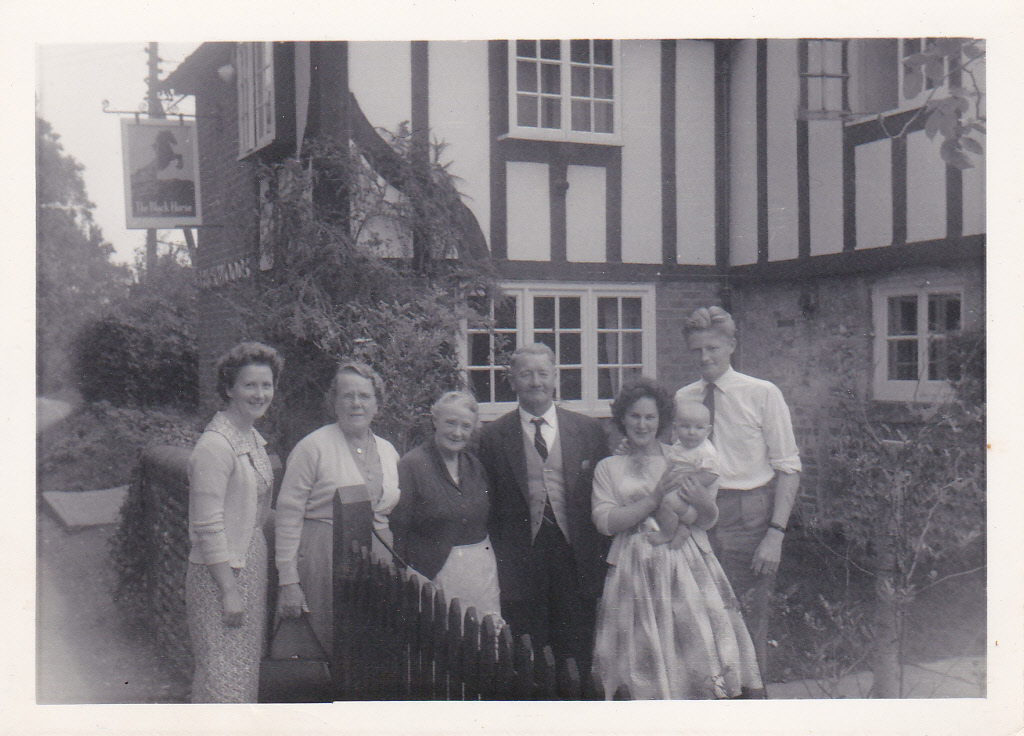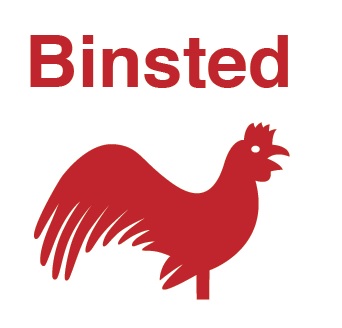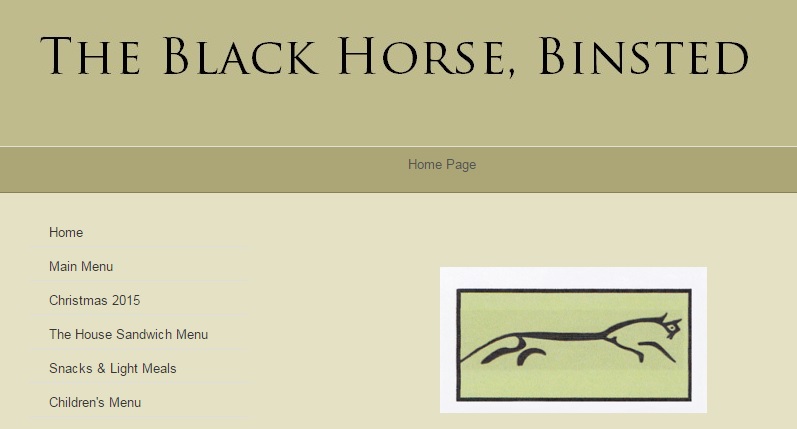The Black Horse Pub
Click on the image below to visit the Pub's own website
The pub, run by Clive and Victoria Smith, both brings many regular visitors to enjoy Binsted, and is itself a vital part of the Binsted community. And has been for generations ... some of its history is told in the selections below from our book 'Binsted and Beyond'.
The Black Horse Pub during World War Two
Bill Pethers, born in the Black Horse pub at Binsted in 1940, remembers it as a safe haven.
‘They bombed Ford and everybody was frightened for their lives. We all congregated over at the Black Horse. Goodness knows why, because we had a shelter at the back of the house. I have vague memories of going down into it. Dad said we only spent about three nights in there, and basically the water table came up and we were up to our knees in water in the morning, so they abandoned that. They thought it best if everybody congregated in one place, and there seemed to be less chance of dying. At the Black Horse it was warm, it was light - we had no electricity at the Manor House. It was all oil lamps - we did not get electricity at home until about 1950.
‘I can remember being taken across the Park. Obviously we did not go along the road, we came along the back beside Kent’s Cottage, and Dad had a big old bike. He built a piece of wood on the crossbar and I sat on this lump of wood, with my feet on little straps in front - it was not very comfortable, I can remember that - and he would cycle across there. Mother could not ride a bike, and I can remember her trailing along behind. We would all go across there every night and come back early in the morning to see to the chickens, geese and dogs. It was only at night time that we actually left the place. In those days you could leave a house, even in the middle of a war, and you would not worry about burglars, you were worried about the Germans bombing you in the night.
‘None of our bedrooms at home were heated. It was bitterly cold and they used to say that as a baby, I would scream the place down when I was over here, and as soon as I was taken across to the Black Horse I immediately stopped. In fact they got into the habit of putting me in the carrycot and would bang on the door, ‘here he is’, and bang, they would leave me there. Nan would scoop me up and it was always warm and comfortable over there, and there was the smell of - I don’t know, cigarette smoke and beer and voices, and everything seemed to be happy.
‘The Black Horse in those days, even after the war, was the centre of the village really. Everything went on there. People came to the Black Horse from all over the country. Nan and Grandad were there for forty odd years so she knew everybody. Nan was the centre of attraction, she ran everything. She brought all these evacuees down in the war. I mean, you could bring one or two down, but she brought about fourteen. They were living out there in the hut - a large wooden building that was converted, warm in the summer and freezing in the winter. All the money from the pub went on food for people and it was more or less frittered away. The evacuees went on coming down here, years later they were bringing their grandchildren.
She would always put them up, there was always a bed somewhere. All the rooms upstairs were given colours; I was born in the Yellow Room, facing over the back. There was a Pink Room, a Blue Room, and all these rooms were painted their colour. She had these great big feather beds, you know the song ‘Grandma’s Old Feather Bed’ - they were like that. You had to scramble up on top of this thing. And the wind used to howl, I can remember that, because it is very exposed. There was no double glazing and the wind used to whistle through the windows.
‘During the war, I can just remember, you could not go to sleep at night because of the noise, singing and shouting and dancing outside. Every day seemed to be a party. Grandad was a real Cockney lad. He was brought up in the East End and he had all these songs - he could reel off rhyme after rhyme after rhyme, song after song. The piano used to be played and people were singing outside; buckets of beer - because they couldn’t get to the bar, you’d serve them with a bucket, they’d go and help themselves.
‘At the Black Horse during the war my recollection is of troops being there, people in every sort of uniform. We had some New Zealanders, and a lot of RAF people. There was Danny Daniels, I think he was a Pilot Officer by the number of pips on his shoulder. He was killed, and a lot of the pilots that visited the pub, they were gone. Out of six of them, four of them died. There were stories that they used to tell, Auntie Rene said they ran out of beer at the pub and they would go off down to Tangmere or down to Ford and get invited into the mess where they had some beer.
‘The place was always full of smoke. When I was old enough to serve at the bar, about 12, in the evening the smoke would come down and down like a smog, and you could see this sort of gap where the people were. The ceilings were low, and it just seemed to build and build, until you could only just see people out of the gloom.’
The Black Horse Pub after the Second World War
Arthur Wickstead remembers living at the pub from 1948, then in Church Farm bungalows, and finally in Arundel.
Interviewed by Vicki Bryceson, he remembered that at the pub ‘There was hardly anybody from ‘outside’, except on a Saturday night ‘though you’d always find the odd one or two from villages round about’. ‘All these farm workers, nursery workers and agricultural workers were the same sort of people, and they got on well together.’ When the turkey farm started ‘round in the bottom end of Binsted’, there was ‘an influx of people from all over the place working down there and they used to more or less keep the pub going. They was up there, well, every night I expect. There must have been at least a dozen or more, and all heavy drinkers.’
Weekend shooting parties also helped keep the pub going. Mrs Pethers did not sell ‘anything much in food then’ – as appears above, she preferred to give it away – but she did make her own pickled eggs and shallots. The ‘local bobby on a bike’ had to check that pubs were observing closing time, and Arthur remembers ‘one night I was in there, and a sergeant copper and a policeman came in, and “whose beer is that” and “whose beer is that”, and of course, one of them was mine. The sergeant done all the spouting and of course Henry [Pethers] said, well, I am the son from down the road and I always stop for a bit of supper last thing. All of a sudden the copper said to the sergeant who we were. He said I was a lodger there and someone else was a lodger there and there was his son and the old man. The sergeant turned to the copper and said “Why didn’t you tell me these people were living here?” and he said “Well you never asked me”.
‘The ‘local bobby’ was ‘pretty friendly, like they were. They could always go to the back door for a bit of information that you pick up in pubs. Me being a bit of a pub crawler you used to get to know all these things. Even in the Norfolk Hotel in Arundel there was always a little ‘down below’ bar there where the local coppers used to get together and have a ‘pow wow’.’
The pub-crawling lifestyle did not, it seems, affect Arthur’s health. ‘I used to do a lot of cycling purely for sport then, and very often I used to get home from work, have my food, a proper meal at about six o’clock in the evening, and cycle off to Brighton and back, calling quite often at the greyhound racing. I had a good racing bike then. I used to do it pretty quick, but it used to take longer coming back because I used to call at about three or four pubs. Those were the days!’
Below is a photo of Pethers family and the Black Horse pub in the early 1950s, kindly supplied by relative Mark Field.

The Black Horse Pub in the 1960s
John North remembers the pub in the sixties, and the Inauguration of the Noble Office of Mayor of Binsted.
Harry Pethers was landlord of the Black Horse from 1928 until 1968. He died in 1968 at the age of 82. His wife ‘Win’ carried on as landlady until her death in 1969. The pub in those days was just a beer house, but Harry obtained a spirit licence before his death. Both Harry and Win were generous to extremes. Whenever one of the regulars had a birthday, Win would supply a wonderful buffet, and wouldn’t dream of taking payment. She did this kind of thing all the time that she was landlady. There were not many regulars in those days but everybody was friendly and joined in everything.
Arthur Wickstead and Herbie Hampton lived at the pub, and of course were two of the regulars, as well as Reg Tutt and myself, and some of the farmworkers of the village. There was a very friendly atmosphere all round, and occasionally Harry would get up a sing-song – always the old tunes such as ‘Daisy, Daisy’ and other old Music Hall songs. Reg Tutt knew some wonderful old country songs which he would sing and everybody would join in.
Commander Cammidge lived in the village at Morley’s Croft and became a regular with his wife. He decided that there should be a Mayor of Binsted and set things in action. Harry was our first Mayor and was made so on his birthday, Nov. 4th, 1965, and each successive year a new one was elected. It was all light-hearted and great fun, and each mayor was given his responsibilities which he was expected to carry out. Incidentally, no-one outside Binsted was chosen: it was essential that a Binsted resident be elected.
During my year in office I had rather a hard task. We had a hard winter and the snow was very deep, and I was expected to clear the roads and see that everybody in the village was not in trouble. I did my best!! I had a tough time, but we muddled through, and again I must stress that everything was done in a light-hearted manner.
It was a sad day when Win Pethers died. She and Harry had been there for so many years and were greatly loved and respected. But life had to go on. We had a succession of landlords and landladies afterwards, the pub was made bigger and a most pleasant restaurant added. People now come from far and wide to eat and of course to drink.
A footnote to the fact that the pub was ‘just a beer house’ in the 1960s came from Maxine Monk, who with her husband Richard ran the pub very successfully between 1994 and 2001: ‘The reason was that the landowners, through the Magistrates, would not allow spirit licences because they didn’t want the serfs to be able to drink what they could.’ Bill Pethers adds that the cost of the licence to the landlord, versus the likely returns from a largely beer-swilling population, was uneconomical.
The Mayoral office was an occasion for much inventive satire and the BBC even came to the pub to record something about it for its morning programme on the Home Service. Several ‘scrolls’ from the Mayoral ceremonies still existed in 2000, as did the Mayoral chain, made of suitable materials such as miniature bottles and cocktail sticks. The scroll for 1966 reads:
LIST YE, ALL YE GOOD CITIZENS OF BINSTED REGIS.
Be it known throughout the Fair Burgh of Binsted-Regis-by-Rife, that the Ratepayers, Taxpayers, Tithepayers and Evaders thereof, have met cautiously and nocturnally with intent to Elect, Choose, Pick or otherwise select a Brother Miscreant into whose clutching hands it will be safe to entrust the Perks, Arisings, Leavings and other Proceeds of their Local Misappropriations, in the sure knowledge that he will be under surveillance day and night whilst in possession of such Misbegotten Valuables.
The Selection of such a Man for the Post also carries with it the covering Office of Lord Mayor of Binsted Regis.
GOD SAVE THE QUEEN.
The Noble Office of Lord Mayor of Binsted Regis is, of course, of considerable antiquity and it should be noted that, so far, no Occupant of the Office has yet failed to display the requisite qualities of Backsliding, Crookedness, Double-Dealing and, in fact, all those forms of Nefariosity which are so necessary in the holding of any present-day Public Office if the Occupant wants to stay out of Clink.
Now, therefore, let it be proclaimed to the Burghers, Residents, Inmates and Layabouts of Binsted Regis that it seemed consistent with their Safety and Wellbeing, to appoint HARRY JOSHUA PETHERS the Jovial Boniface of the Black Horse Inn, Binsted Regis, to undertake a second Term of Office as His Washup, the Lord Mayor of the said Binsted Regis.
This we have done in the Firm Belief that he will continue further to elaborate and even to embroider, details of his previous Curious Criminal Career, and to keep in Mind wot the Burghers have been up to recently in their more crooked Bleck Deeds.
HURRAH FOR HARRY. GOD SAVE THE QUEEN.
Given under our Hand this 1st: Day of November 1966,
Sir Bill Bogus, First Baron Backsliding of Binsted Regis.
Lady ‘Slippery’ Pinch, Kommandant of the Ladies Kleptomaniacs Korps.
Alf ‘All, Just a Burgher. Willy Washout, The Water Board.



